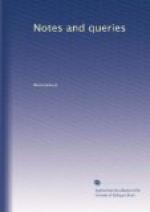This order appears to have been framed at a time when there was no separate gallery exclusively appropriated to strangers, and when they were introduced by members into the gallery of what is called the “body of the house.” This state of things had passed away: and for a long series of years strangers had been admitted to a gallery in the House of Commons in the face of the sessional order, by which your correspondent CH. imagines their presence was “absolutely prohibited.”
When I speak of strangers being admitted, it must not be supposed that this was done by order of the House. No, every thing relating to the admission of strangers to, and their accommodation in the House of Commons, is effected by some mysterious agency for which no one is directly responsible. Mr. Barry has built galleries for strangers in the new house; but if the matter were made a subject of inquiry, it probably would puzzle him to state under what authority he has acted.
Mr. Christie wished to make the sessional order applicable to existing circumstances; and, it may be, he desired to draw from the House a direct sanction for the admission of strangers. In the latter purpose, however, if he ever entertained it, he failed. The wording of his amendment is obscure, but necessarily so. The word “gallery,” as employed by him, can only refer to the gallery appropriated to members of the House; but he intended it to apply to the strangers’ gallery. The order should have run thus, “admitted into any other part of the house, or into the gallery appropriated to strangers;” but Mr. Christie well knew that the House would not adopt those words, because they contain an admission that strangers are present whilst the House is sitting, whereas it is a parliamentary fiction that they are not. If a member in debate should inadvertently allude to the possibility of his observations being heard by a stranger, the Speaker would immediately call him to order; yet at other times the right honourable gentleman will listen complacently to discussions {84} arising out of the complaints of members that strangers will not publish to the world all that they hear pass in debate. This is one of the consistencies resulting from the determination of the House not expressly to recognise the presence of strangers; but, after all, I am not aware that any practical inconvenience flows from it. The non-reporting strangers occupy a gallery at the end of the house immediately opposite the Speaker’s chair; but the right hon. gentleman, proving the truth of the saying, “None so blind as he who will not see,” never perceives them until just as a division is about to take place, when he invariably orders them to withdraw. When a member wishes to exclude strangers he addresses the Speaker, saying, “I think, Sir, I see a stranger or strangers in the house,” whereupon the Speaker instantly directs strangers to withdraw. The Speaker issues his order in these words:—“Strangers must withdraw.”




